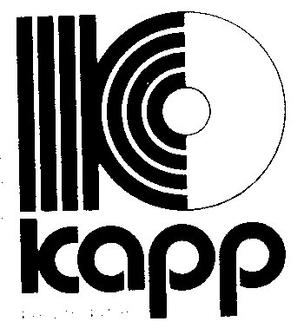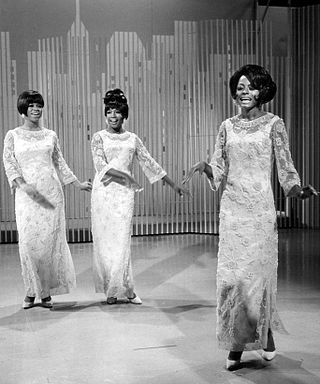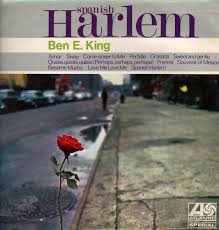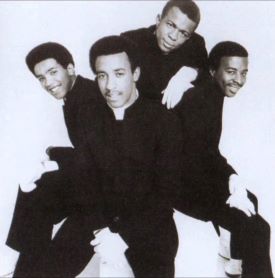Related Research Articles
Johnny Wakelin is an English recording artist best known for songs like "Black Superman" and "In Zaire", both celebrating boxer Muhammad Ali.

Kapp Records was an independent record label started in 1954 by David Kapp, brother of Jack Kapp. David Kapp founded his own label after stints with Decca and RCA Victor. Kapp licensed its records to London Records for release in the UK.

American girl group The Supremes have released 29 studio albums, four live albums, two soundtrack albums, 32 compilation albums, four box sets, 66 singles and three promotional singles. The Supremes are the most successful American group of all time, and the 26th greatest artist of all time on the US Billboard charts; with 12 number-one songs on the Billboard Hot 100 and three number-one albums on the Billboard 200. The Supremes were the first artist to accumulate five consecutive number-one singles on the US Hot 100 and the first female group to top the Billboard 200 albums chart with The Supremes A' Go-Go (1966). In 2017, Billboard ranked The Supremes as the number-one girl group of all time, publishing, 'although there have been many girl group smashes in the decades since the Supremes ruled the Billboard charts, no collective has yet to challenge their, for lack of a better word, supremacy.' In 2019, the UK Official Charts Company placed 7 Supremes songs—"You Can't Hurry Love" (16), "Baby Love" (23), "Stop! In the Name of Love" (56), "Where Did Our Love Go?" (59), "You Keep Me Hangin' On" (78), "Come See About Me" (94) and "Stoned Love" (99)—on The Official Top 100 Motown songs of the Millennium chart, which ranks Motown releases by their all-time UK downloads and streams.
"(I Know) I'm Losing You" is a 1966 hit single recorded by the Temptations for the Gordy (Motown) label, written by Cornelius Grant, Eddie Holland and Norman Whitfield, and produced by Norman Whitfield.

"Spanish Harlem" is a song recorded by Ben E. King in 1960 for Atco Records. It was written by Jerry Leiber and Phil Spector and produced by Jerry Leiber and Mike Stoller. "Spanish Harlem" was King's first hit away from The Drifters, peaking at number 15 on Billboard's rhythm and blues and number 10 in pop music chart.

This is a discography chronicling the musical career of James Brown. Brown joined Bobby Byrd's vocal group The Flames in 1953, first as a drummer, and then as leading front man. Later becoming The Famous Flames, they signed with Federal Records in 1956 and recorded their first hit single, "Please, Please, Please", which sold over a million copies.

"Knock on Wood" is a 1966 hit song written by Eddie Floyd and Steve Cropper and originally performed by Floyd. The song has become covered by later artists, most notably Amii Stewart in 1979. Stewart's disco version was the most successful on weekly music charts.

Ruby & the Romantics was an Akron, Ohio-based American R&B group in the 1960s, composed of Ruby Nash, George Lee, Ronald Mosely, Leroy Fann and Ed Roberts.

"Piece of My Heart" is a romantic soul song written by Jerry Ragovoy and Bert Berns, originally recorded by Erma Franklin in 1967. Franklin's single peaked in December 1967 at number 10 on the Billboard Hot Rhythm & Blues Singles chart in the United States.
"If I Were a Carpenter" is a folk song written by Tim Hardin in the 1960s, and re-recorded with commercial success by various artists including Bobby Darin, The Four Tops and Johnny Cash. Hardin's own recording of the piece appeared on his 1967 album Tim Hardin 2. It was one of two songs from that release performed by Hardin at Woodstock in 1969. The song, believed by some to be about male romantic insecurity, is rumored to have been inspired by his love for actress Susan Morss, as well as the construction of Hardin's recording studio.

"Tell It Like It Is" is a song written by George Davis and Lee Diamond and originally recorded and released in 1966 by Aaron Neville. In 2010, the song was ranked No. 391 on Rolling Stone magazine's list of The 500 Greatest Songs of All Time.

The discography of American alternative rock band Soul Asylum consists of 12 studio albums, two live albums, five compilation albums, two extended plays (EPs), 22 singles, and 17 music videos. Formed in 1981 in Minneapolis, Minnesota using the name Loud Fast Rules, the band's original lineup consisted of vocalist Dave Pirner, guitarist Dan Murphy, bassist Karl Mueller, and drummer Pat Morley. The band changed their name to Soul Asylum prior to the release of Say What You Will... Everything Can Happen in 1984. Later that year, Morley was replaced on drums by Grant Young.

"People Got to Be Free" is a song released in 1968 by the Rascals, written by Felix Cavaliere and Eddie Brigati and featuring a lead vocal from Cavaliere.

"Turn On Your Love Light" is a rhythm and blues song recorded by Bobby Bland in 1961. It was an important R&B and pop chart hit for Bland and has become one of his most identifiable songs. A variety of artists have recorded it, including the Grateful Dead, who made it part of their concert repertoire.
"I (Who Have Nothing)" (sometimes billed as "I Who Have Nothing") is an English language cover of the Italian song "Uno dei Tanti" (English: "One of Many"), with music by Carlo Donida and lyrics by Giulio "Mogol" Rapetti. The initial version, "Uno dei Tanti", was performed by Joe Sentieri in 1961. The song first recorded in English by Ben E. King in 1963 with new lyrics by Jerry Leiber and Mike Stoller.
"Detroit City" is a song written by Danny Dill and Mel Tillis, made famous by Billy Grammer, country music singer Bobby Bare and Tom Jones. Bare's version was released in 1963. The song — sometimes known as "I Wanna Go Home" — was Bare's first Top 10 hit on the Billboard Hot Country Singles chart that summer, and became a country music standard.

The Unifics were an American soul group from Washington, D.C.

"Younger Girl" is a song written by John Sebastian and originally recorded by his band, the Lovin' Spoonful, for their 1965 debut album Do You Believe in Magic. The tune and lyric are based upon "Prison Wall Blues" (1930) by Cannon's Jug Stompers.

"Then You Can Tell Me Goodbye" is a song written by John D. Loudermilk. It was first released in 1962 by Don Cherry, as a country song and again as a doo-wop in 1967 by the group The Casinos on its album of the same name, and was a number 6 pop hit that year. The song has since been covered by Eddy Arnold, whose version was a number 1 country hit in 1968, and by Neal McCoy, whose version became a Top 5 country hit in 1996.
"Time Is Tight" is an instrumental recorded by Booker T. & the M.G.'s for their soundtrack to the 1968 film UpTight.
References
- ↑ Biography, Allmusic.com
- ↑ Billboard, Allmusic.com
- 1 2 Chart Positions, Allmusic.com
- ↑ Joel Whitburn, The Billboard Book of Top 40 Hits. 7th edn, 2000
- ↑ "RPM Top 100 Singles - March 2, 1968" (PDF).
- ↑ "Billboard Hot 100 - November 9, 1968". Billboard .
- ↑ "RPM Top 100 Singles - November 25, 1968" (PDF).